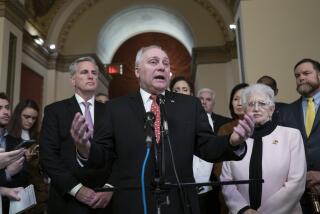Bush’s Fix at Gas Pumps: Tax Relief
- Share via
WASHINGTON — President Bush, under fire for not doing more to contain soaring gasoline prices, said Friday that he believes the best immediate answer is an income tax cut that would put more money back into Americans’ pockets.
“I want to remind the members of Congress, both Republican and Democrat, all of us are concerned about high energy prices and prices at the gas pump being too high,” Bush said. “Let’s get the tax relief done and do it quickly.”
Bush devoted much of a White House news conference to defending his administration’s priorities, insisting that he considers conservation to be an important element of a national energy strategy. His remarks appeared to be part of a public relations campaign designed to counter perceptions that the administration is too focused on fossil fuels.
Today, Bush will use his radio address to promote some of the more environmentally friendly provisions of the national energy plan that he and Vice President Dick Cheney are scheduled to unveil Thursday. Those provisions include incentives to conserve energy and tax credits for renewable fuel programs.
Bush and Cheney, both former oilmen, have drawn criticism from Democrats for placing too much emphasis on increasing production of oil, coal and nuclear power and not enough on energy conservation, efficiency improvements and renewable energy such as solar and wind power.
In recent days, GOP lawmakers have expressed concern that a failure to offer any kind of immediate relief from high energy prices could hurt the party in the 2002 elections.
Bush insisted at Friday’s news conference that the only quick fix for rising pump prices is the across-the-board income tax cut included in his budget.
“There is no such thing as immediate supply,” Bush said. “The quickest way to help people with their energy bills is tax relief.”
Congressional Democrats quickly demurred. “Surely, President Bush understands that tax breaks for the wealthiest will not solve every problem facing America,” said Rep. Martin Frost (D-Texas).
Bush once again cited California’s electricity turmoil as evidence of the need for a new national energy strategy. And to a greater extent than in past remarks, he emphasized the need to conserve.
“We need to encourage the development of technologies to help us conserve. We need to be conservation-minded in America,” Bush said. “But I’m also going to say, as plainly as I can, we won’t conserve our way to energy independence. We must also increase supply. It’s in the consumers’ interest that we do so. The more supply there is relative to demand, the less the price will be. And I believe that we can have exploration and sound environmental policy go hand in hand.”
The administration’s energy plan is expected to call for, among other things, opening up more federal land to oil and gas exploration, encouraging development of more nuclear power, streamlining the approval process for power plants and empowering federal authorities to use eminent domain to acquire private property for transmission lines.
Bush indicated that the report also will address industry complaints about regulatory barriers to construction and expansion of oil refineries. A shortage of refining capacity has been cited as a key factor in the gasoline price run-up.
“What this nation needs to do is to build more refining capacity,” Bush said. “That may require us to analyze all regulations that discourage development.”
Administration officials say the energy plan will contain tax incentives to promote energy efficiency and renewable fuels. Tax credits will be proposed for purchases of “hybrid” cars powered by electricity and gasoline, for example, as well as for expanded use of fuel cells, biomass fuels, solar panels and wind power.
Fuel cells are hydrogen-powered batteries that produce no pollution. Biomass is a category of fuel generated from agricultural crops, trash and trees and used to fire electrical generators.
The administration also is reassessing proposed cuts to federal energy efficiency and renewable fuel programs. David Nemtzow, president of the Alliance to Save Energy, a coalition of business, consumer, government and environmental leaders, said the White House appeared to have realized that previous comments expressing doubt about the potential effect of conservation were not playing well with the public.
“They’re definitely getting the message,” Nemtzow said. The question, he said, is whether the administration’s “comforting words” will turn into “comforting deeds.”
The 100-page report to be issued by the energy task force headed by Cheney will contain eight chapters, administration officials said. Each will include recommendations for administrative, legislative, budget and tax code actions.
Administration officials said the plan will not roll back environmental regulations, but it will direct the Environmental Protection Agency to review the agency’s enforcement of a clean air rule that industry officials have criticized for slowing the construction or expansion of power plants and oil refineries.
More to Read
Sign up for Essential California
The most important California stories and recommendations in your inbox every morning.
You may occasionally receive promotional content from the Los Angeles Times.











